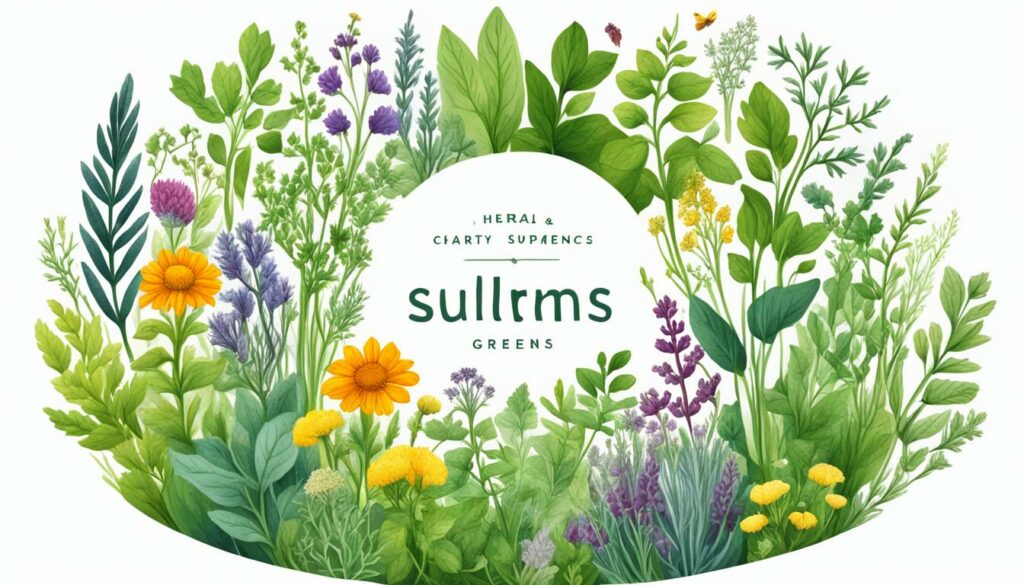Are you tired of relying on synthetic drugs with their long list of side effects? Are you searching for a more natural and holistic approach to your health? Look no further than the power of plant-based remedies. From ancient herbal medicine to modern alternative therapies, the world of natural remedies offers a wealth of options to support your well-being.
Plant-based remedies, also known as herbal remedies, have been used for centuries to promote wellness and treat various ailments. Unlike conventional medicine, which often focuses on isolated compounds, plant-based remedies harness the healing potential of whole plants. By utilizing the synergistic effects of nature’s pharmacy, these remedies offer a gentler and more balanced approach to healing.
But what exactly are plant-based remedies? How do they work, and can they truly deliver on their promises of holistic health? In this article, we will explore the world of herbal medicine, its history, uses, and precautions. Whether you’re curious about alternative medicine or seeking natural solutions for your health concerns, join us on this journey to discover the power of plant-based remedies.
What are Herbal Supplements?
Herbal supplements are products made from plants that are used to treat diseases or maintain health. They can be taken internally in the form of capsules, powders, or tinctures, or used topically as gels, lotions, or creams.
Herbal supplements have a long history of use and are commonly used by American consumers. However, they are not regulated by the FDA like prescription drugs. The FDA considers herbal supplements as foods rather than drugs, which means they are not subject to the same testing, manufacturing, and labeling standards.
It is important to consult with a healthcare professional before using herbal supplements, as they can interact with conventional medicines and have strong effects. It is also important to educate yourself about the herbs you are taking and choose reputable manufacturers.
Types of Herbal Supplements
Herbal supplements come in various forms and can be used for different purposes. Here are some common types:
- Capsules: Herbal extracts in a convenient form for internal use.
- Powders: Finely ground herbs that can be mixed with liquids or added to food.
- Tinctures: Liquid extracts made by soaking herbs in alcohol or vinegar.
- Gels, lotions, and creams: Topical formulations for external use.
Each form has its own advantages and may be suitable for different individuals or conditions.
Benefits of Herbal Supplements
“Herbal supplements offer a natural alternative to synthetic drugs with potentially fewer side effects.” – Dr. Jane Smith, Naturopathic Physician
Herbal supplements have gained popularity due to their potential benefits. Some of the advantages of using herbal supplements include:
- Natural and plant-based: Herbal supplements are derived from plants, making them a natural option for those seeking alternatives to synthetic drugs.
- Potentially fewer side effects: Compared to prescription medications, herbal supplements may have fewer side effects, although individual experiences may vary.
- Support for overall health: Many herbs used in supplements have been traditionally associated with promoting general well-being and supporting specific body functions.
- Personalized approach: With a wide variety of herbs and formulations available, herbal supplements can offer personalized options tailored to individual needs.
It is important to note that herbal supplements are not intended to replace medical treatments or professional advice. Always consult with a healthcare professional before starting any new supplement regimen.
| Popular Herbal Supplements | Uses |
|---|---|
| Black Cohosh | Used for menopausal conditions and uterine spasms. |
| Echinacea | Used to strengthen the immune system and prevent colds and flu. |
| Ginkgo Biloba | Used for aging-related conditions such as poor circulation and memory loss. |
| Ginseng | Used as a general tonic to increase overall body tone and improve resistance to stress. |
| Milk Thistle | Used for liver conditions and detoxification support. |
| Valerian Root | Used for sleep disorders and anxiety. |
Disclaimer: The listed uses are for informational purposes only and are not intended as medical advice. Always consult with a healthcare professional before using any herbal supplement.

Precautions when Choosing Herbal Supplements
When incorporating herbal supplements into your wellness routine, it is essential to exercise caution and seek professional guidance. Although herbal supplements offer numerous health benefits, they can interact with conventional medicines and may have potent effects on the body. To ensure your safety and well-being, it is crucial to consult with a healthcare professional before introducing herbal supplements into your regimen.
Here are some precautions to keep in mind when choosing herbal supplements:
- Consult with a healthcare professional: Seek professional guidance and advice to determine the right herbal supplements for your specific needs. A healthcare provider can evaluate your medical history, current medications, and potential interactions to ensure optimal safety and efficacy.
- Educate yourself: Take the time to educate yourself about the herbs you are considering. Research their benefits, possible side effects, and any precautions you should be aware of. This knowledge will empower you to make informed decisions about your health.
- Contact the manufacturers: Reach out to the manufacturers of the herbal supplements you are interested in. Inquire about their manufacturing processes, quality control measures, and any additional information that can help you make an informed choice.
- Follow dosage instructions: Carefully read and follow the label instructions provided with the herbal supplements. Stick to the prescribed dosage to minimize the risk of side effects and ensure optimal effectiveness.
- Be aware of side effects and allergic reactions: Pay close attention to your body’s response to the herbal supplements. If you experience any side effects or allergic reactions, such as rash, difficulty breathing, or swelling, discontinue use immediately and seek medical attention if necessary.
Remember, herbal supplements are not without risks, and professional guidance and precautions are essential to ensure their safe and effective use. By researching the company, learning about potential interactions, and being aware of side effects, you can make informed choices about incorporating herbal supplements into your holistic health routine.
Herbal Supplements and the FDA
When it comes to herbal supplements, the FDA takes a different stance compared to prescription drugs. Herbal supplements are considered foods instead of drugs, which means they are not subjected to the same rigorous testing, manufacturing, and labeling standards as pharmaceutical products.
While herbal supplement labels can provide valuable information on how certain herbs may influence the body, they cannot make claims to treat specific medical conditions. It’s important to note that the FDA does not evaluate the safety or effectiveness of herbal supplements before they hit the market. This lack of regulation leaves consumers with the responsibility of doing their own research and exercise caution when choosing these products.
One of the issues with herbal supplements is the lack of standardization. The term “standardized” that you may find on a supplement label does not have a consistent meaning across different manufacturers. Unlike prescription drugs, herbal supplements are not required to have a standardized formula, which can result in variations in potency and effectiveness.
The Importance of Labeling Information
Labeling information plays a crucial role in helping consumers make informed decisions about herbal supplements. While not as comprehensive as drug labeling, herbal supplement labels must disclose certain information such as the name of the product, the quantity of the product, and the manufacturer’s contact information.
Additionally, herbal supplement labels may provide directions on proper use and dosage, potential side effects, and any potential interactions with other medications. It’s essential to thoroughly read and understand these labels to ensure safe and effective use of herbal supplements.
Did You Know? Herbal supplement labels cannot claim to treat specific medical conditions but can provide valuable information on how certain herbs may influence the body.
Choosing Quality Herbal Supplements
Given the lack of regulation, it’s crucial to be vigilant when choosing herbal supplements. Here are some tips to consider:
- Research the manufacturer: Look for reputable manufacturers who follow good manufacturing practices and have a strong track record of producing quality products.
- Consult with healthcare professionals: Before starting any herbal supplement, it’s important to consult with a healthcare professional who can provide guidance based on your specific health needs and potential interactions with other medications.
- Do your own research: Educate yourself about the specific herbs you are considering and their potential benefits and risks. This will help you make more informed decisions when choosing herbal supplements.
By being proactive and informed, you can navigate the world of herbal supplements more safely and confidently.
Information on Herbal Supplement Labels
| Label Information | Description |
|---|---|
| Name of the product | The name or brand of the herbal supplement |
| Quantity of the product | The amount of the herbal supplement in the package |
| Manufacturer’s contact information | How to reach the manufacturer for inquiries or concerns |
| Directions for use and dosage | Instructions on how to take the supplement and recommended dosage |
| Potential side effects | Information on possible adverse effects or reactions |
| Interactions with other medications | Potential interactions between the herbal supplement and other medications |

Being aware of FDA regulations and label information is crucial when considering herbal supplements. By understanding the limitations and potential risks associated with these products, you can make informed choices to support your holistic health journey.
Common Herbal Supplements
Herbal supplements are widely used for various purposes, offering natural alternatives to traditional medications. Here are some common herbal supplements and their uses:
| Herbal Supplement | Uses |
|---|---|
| Black Cohosh | Used for menopausal conditions and uterine spasms |
| Echinacea | Strengthens the immune system and helps prevent colds and flu |
| Garlic | Used for cardiovascular conditions and high cholesterol |
| Ginkgo Biloba | Improves poor circulation and memory loss associated with aging |
| Ginseng | Acts as a general tonic to increase overall body tone and improve resistance to stress |
| Saw Palmetto | Used for enlarged prostate |
| St. John’s Wort | Helps with mild to moderate depression |
It is crucial to consult with a healthcare professional before incorporating any herbal supplements into your routine, as they can interact with medications and have potential side effects. Safety and efficacy should always be prioritized.

Remember, natural remedies can be a valuable addition to your health regimen, but informed decision-making is key to ensure their proper use and maximum benefits.
The History of Herbal Medicine
Herbal medicine, also known as botanical medicine or phytomedicine, has a long and rich history of use in various cultures. Dating back thousands of years, plants have been utilized for their medicinal properties, with ancient writings documenting the use of herbs in healing rituals. Traditional medical systems such as Ayurveda in India and Traditional Chinese Medicine have developed comprehensive herbal therapies for a wide range of conditions.
Through modern research and analysis, the effectiveness and benefits of herbal medicine are gaining recognition in treating and preventing diseases. Scientific advancements have allowed for a deeper understanding of the active compounds present in plants, shedding light on their therapeutic potential. The utilization of herbal medicine continues to evolve as new discoveries are made and traditional knowledge is combined with contemporary research.
It is estimated that approximately 80% of people worldwide rely on herbal medicines for their primary healthcare needs. This widespread use is a testament to the enduring trust and efficacy of herbal remedies. However, it is important to note that herbal medicines are not subject to the same regulatory standards as prescription drugs. As such, it is crucial to seek guidance from a healthcare professional when incorporating herbal medicines into your healthcare regimen.
While herbal medicine offers promising possibilities, caution and informed decision-making are key in order to ensure optimal health outcomes. By consulting with a healthcare professional and staying informed about the herbs you use, you can safely harness the power of herbal medicine to support your well-being.

| Traditional Medicine | Ancient Use | Modern Research |
|---|---|---|
| Ayurveda | Used herbs to restore balance and promote overall health | Ongoing studies explore Ayurvedic herbs for various conditions |
| Traditional Chinese Medicine | Used a combination of herbs to restore the flow of Qi (life force) | Research investigates the effectiveness of Chinese herbal formulas |
| Native American Medicine | Utilized local plants for healing and spiritual ceremonies | Scientists study Native American medicinal plants for potential therapeutic applications |
What is Herbal Medicine Used For?
Herbal medicine offers a natural and holistic approach to treating various conditions and symptoms. From allergies and asthma to premenstrual syndrome, rheumatoid arthritis, fibromyalgia, migraines, menopausal symptoms, chronic fatigue, irritable bowel syndrome, and even cancer, herbal medicine provides a wide range of potential benefits.
However, it is crucial to consult with a healthcare professional before incorporating herbal medicines into your treatment plan. This is because certain herbs can interact with prescription medications and may worsen specific medical conditions. Seeking the guidance of a trained provider ensures safe and effective usage of herbal remedies.
When using herbal medicine, it is advisable to opt for standardized supplements. These supplements offer consistent effectiveness and adhere to rigorous quality standards. By following these precautions and working closely with a healthcare professional, you can tap into the potential of herbal medicine for improved well-being and a more holistic approach to health.

